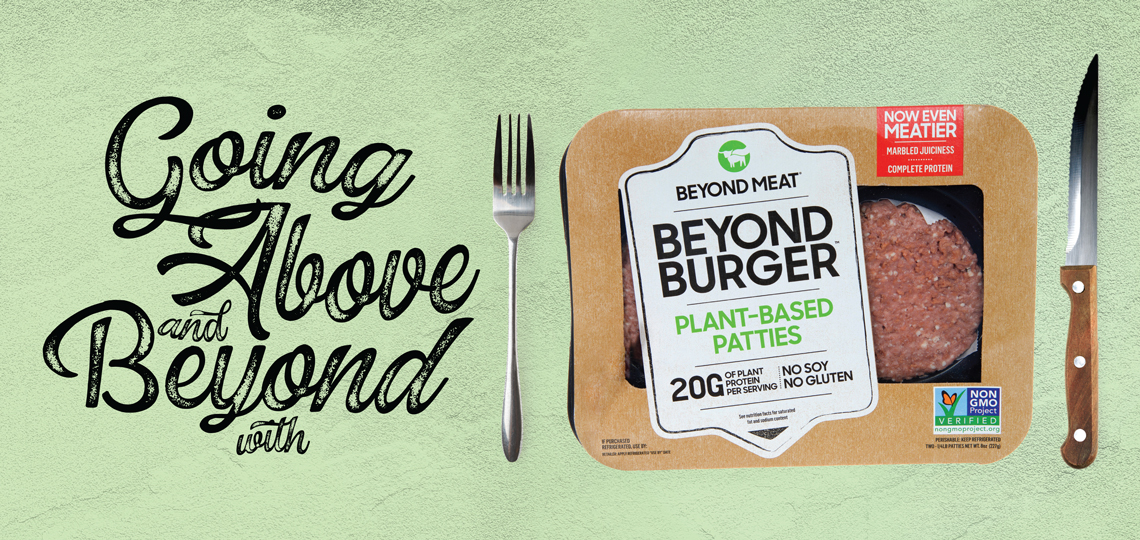by Miri Rotkovitz, MA, RD
If you find it hard to imagine going a day without meat, you’re not alone. According to USDA statistics, the average American will consume over 217 pounds of meat in 2019. Yet according to the Dietary Guidelines for Americans, the total daily recommendation for all protein foods (including eggs, beans, and legumes) tops out at 6 ounces – or about 137 pounds a year for most adults. Simply put, many of us eat far more meat than we need, and that has implications not only for our personal health, but for that of the planet.
Enter Beyond Meat, a mission driven company that’s keen to change that equation with its plant-based burgers, ground “meat” and sausages. Unlike other meat substitutes, Beyond’s products are designed to look, cook, and taste like the real thing. Made primarily with pea protein, they’re soy-free, gluten-free, non-GMO, and pareve to boot. And as OK Account Manager Chasha Brownstein and Rabbinic Coordinator Rabbi Shlomo Klein both asserted, from the moment the company started working with the OK, they’ve gone “above and beyond” to ensure that their products meet OK ’s exacting kashrut standards.
Chief Growth Officer Chuck Muth – a former Coca Cola executive who came out of retirement and moved across the country for the opportunity to work with a company “that could change the world” – explains that Beyond Meat had “lots of requests” for kosher-certified products. Though kosher-keepers represent a relatively “small part of the population, it’s an important part,” for a company that aims to be a “truly global brand.” More to the point, “you don’t change the world by convincing vegetarians to eat less meat.”
Muth credits the company’s Israeli distributor, Kaya International, for making the shidduch between Beyond Meat and the OK. As Brownstein relates, it was a relationship borne of necessity. Beyond Meat was preparing a product for shipment
to Israel, “and of course they won’t let it in without a proper certification.” But Beyond Meat was quick to recognize “that consumers in the US and elsewhere would really want the products to be certified” too. Though vegetarianism isn’t especially common in the frum community, there’s enthusiasm for Beyond’s products nonetheless. Nowadays, “the religious community is much more knowledgeable about and interested in health, and healthy eating, and healthy living” says Brownstein, “and I think these products are taking off because of that. The idea that it’s pareve, and healthy, and plant based,” holds huge consumer appeal, “and it’s good because when [companies] know consumers are asking for it, it helps get things moving” on the certification front.
For Muth and Allison Aronoff, Beyond Meat’s Senior Communications Manager, achieving kashrut certification is about inclusivity. Ultimately, says Aronoff, Beyond Meat’s goal is to drop prices in order to expand access to as many people as possible. That’s an unusual thing to hear in a profit driven-world, but coming from a company that hopes to improve public health and environmental wellbeing, it’s not surprising. Arnoff shared the staggering statistic that the amount of water in an average swimming pool can produce 312 beef burgers, or 60,837 Beyond Burgers. The collective impact of Americans replacing one weekly beef burger to a Beyond Burger would be akin to taking 12 million cars off the road for a year!
With that motivation, the company spares no expense when it comes to research and development, and getting its products just right. Brownstein relates that at one point, Beyond Meat was interested in sourcing a plant based protein from a Chinese supplier with questionable kashrut standards. OK worked to help Beyond Meat find an acceptable supplier closer to home. “The issue,” explained Brownstein, “was that most of the suppliers of that protein do soy in the same facility, and everything they were testing was coming back positive for soy, and they didn’t want it.” Yet, as Rabbi Klein related, the “Beyond Meat personnel were very understanding, and arranged for us to visit the plant…and it continues to be monitored by our Rabbinic staff.” That’s just one example of Beyond Meat’s commitment to an “excellent kosher program,” designed to help the company as it grows and adds new facilities. “All the Beyond meat people, including the quality assurance personnel and management, take their kosher related responsibilities very seriously and they treat their kosher program with the utmost respect. They actually go above and beyond.”
So how does Beyond Meat taste? Reviews are overwhelmingly positive. Rabbi Klein, who sampled both the burger and sausage, quips “I don’t usually get my grilling right, I take it off raw or leave it on until it’s overdone, nevertheless it was very good.” So good, in fact, that Rabbi Klein explains “Beyond Meat products are a perfect solution for those people that on the one hand do not want to eat meat (for various legitimate reasons, see also Pesachim 49b) and on the other want to fulfill the obligation of Oneg (delight) on Shabbos and Simcha (joy) on Yom Tov. (See Shulchan Aruch 250:2, Shulchan Aruch HaRav 242:1–2 and 529:7.) One can fulfill this obligation with the Beyond Meat products because it will give you the same joy and delight just as real meat.” Who’d have thought that when we sing on Shabbos about basar v’dagim v’chol matamim, all of those delicious things
might refer to something that looks and tastes like meat, but goes beyond?!


 EN
EN  ZH
ZH  KR
KR  BR
BR  ES
ES  IN
IN  IL
IL 




